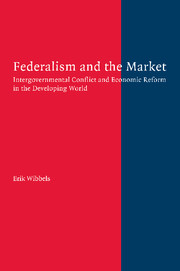Book contents
- Frontmatter
- Contents
- Acknowledgments
- 1 Intergovernmental Bargaining and Economic Policy in Federations
- 2 From Market-Preserving to Market-Distorting Federalism: Divergent Incentives and Economic Reform in Developing Nations
- 3 Federalism and the Decentralized Politics of Macroeconomic Policy and Performance
- 4 Testing the Model: Macroeconomic Reform Beyond the Federal-Unitary Distinction
- 5 Partisan Harmony, Intergovernmental Coordination, and Market Transitions: The Case of Argentina
- 6 Regional Competition, Fiscal Dependence, and Incentives in the Argentine Provinces
- 7 The View from Below: The Politics of Public Sector Reform in Three Argentine Provinces
- 8 Conclusion: Federalism, Reform, and Enduring Puzzles
- References
- Index
6 - Regional Competition, Fiscal Dependence, and Incentives in the Argentine Provinces
Published online by Cambridge University Press: 20 July 2009
- Frontmatter
- Contents
- Acknowledgments
- 1 Intergovernmental Bargaining and Economic Policy in Federations
- 2 From Market-Preserving to Market-Distorting Federalism: Divergent Incentives and Economic Reform in Developing Nations
- 3 Federalism and the Decentralized Politics of Macroeconomic Policy and Performance
- 4 Testing the Model: Macroeconomic Reform Beyond the Federal-Unitary Distinction
- 5 Partisan Harmony, Intergovernmental Coordination, and Market Transitions: The Case of Argentina
- 6 Regional Competition, Fiscal Dependence, and Incentives in the Argentine Provinces
- 7 The View from Below: The Politics of Public Sector Reform in Three Argentine Provinces
- 8 Conclusion: Federalism, Reform, and Enduring Puzzles
- References
- Index
Summary
One of the strong points of the model of intergovernmental bargaining developed in Chapter 2 is that it recognizes the diversity of policy preferences across regional politicians, each of which responds to their own electoral and fiscal incentives. Up to this point, however, the empirical chapters have treated regions as an undifferentiated mass – all with incentives to overspend or not depending on the broad characteristics of federations. Consistent with the demands of the model, this chapter shifts the level of analysis from the national and intergovernmental to the subnational, exploring why regions within federations vary so significantly in their responses to market reforms. Previous chapters have emphasized the importance of intergovernmental partisan relations, fiscal institutions, and the size of regional coalitions in national policy-making institutions for shaping the coordination of economic policies in federations as a whole. This chapter, by contrast, focuses on the factors that shape the incentives of individual regional leaders – particulary those that emerge from the competitiveness of their electoral environments. Exploring the subnational incentive structure of regional leaders is important because of the diversity of interests across regions within federations. Likewise, it is these incentives that regional leaders bring to their negotiations with central policy makers. The typical approach in the comparative federalism literature is to assume that intergovernmental institutions generate a common set of incentives for all regional politicians. Such an assumption is problematic in two ways.
- Type
- Chapter
- Information
- Federalism and the MarketIntergovernmental Conflict and Economic Reform in the Developing World, pp. 162 - 196Publisher: Cambridge University PressPrint publication year: 2005



